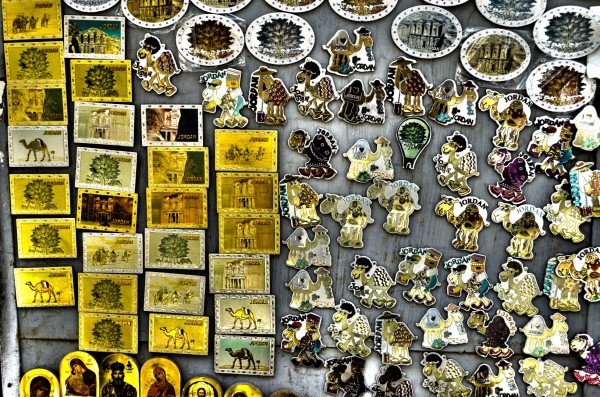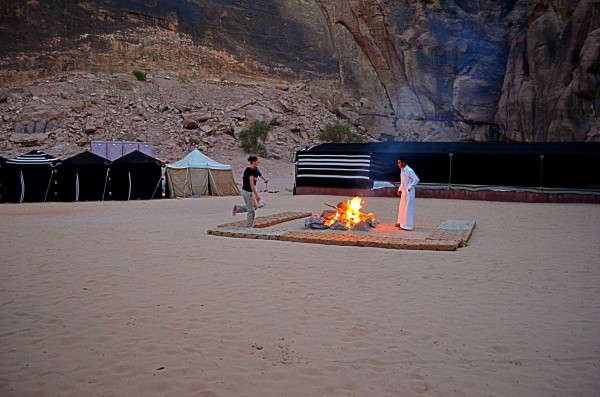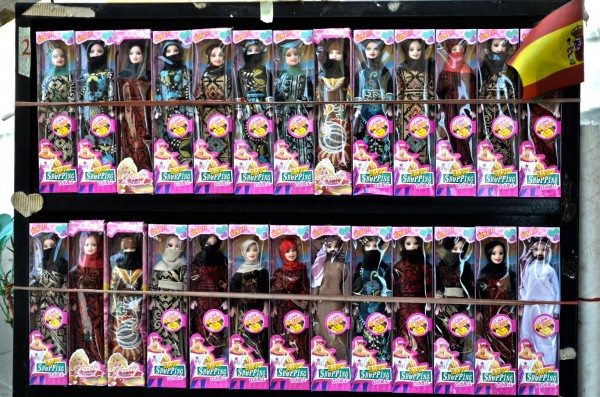Jordan – Five things you may not be aware of
‘I’ll be going to Jordan in another week,’ I told a friend sometime in May this year.
‘Jordan? Good,’ he said, and then after an uncomfortable pause, added, ‘where is Jordan?’
I gave an equally perplexing answer, ‘Somewhere in the Middle East.’
Well, Jordan is actually known as the middle of the Middle East, a region that is known more for the conflicts that afflicts it than anything else. But I must point out here that Jordan is a peace-spot surrounded by conflict… after all the countries around it are Israel, Egypt, Saudi Arabia, and Syria. We therefore read all the news about these surrounding countries but Jordan never ever features in those news spots.
So just as you might not be very sure about its geographical placement, you may not be aware of a few rather interesting facts about this country. I mean, you’d probably have read about Petra but not much beyond that. I’m sure you’ll find this post worth reading twice.
Jordan has no railways for the public
Frankly, I wasn’t aware of this because like anyone else even I had assumed that railways must be there as it is in any other country. But on the second day as we were being driven to the Dead Sea after our Jarash visit, I asked Ayman, my gAdventures CEO, ‘We haven’t come across any railway tracks as yet. I’m asking as all our internal travel, I notice, involves road travel.’
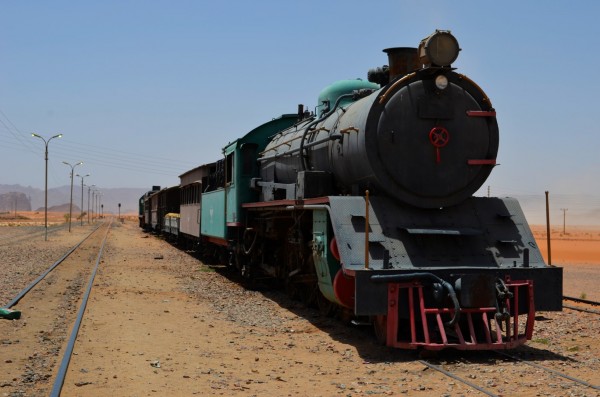
Jordan – This train doesn’t chook-chook anymore and stands here near Wadi Rum as a relic of the past. Jordan doesn’t encourage railways
Ayman smiled and explained, ‘We once had the Hedjaz Jordan railways from Amman to Damascus in Syria. We also had the Hedjaz railways during the Ottoman reign but train tracks are prone to be blown up and…’ He later told us that roads were easier to maintain and were more secure. We were also informed that phosphates are the biggest export in the country and a special freight line called the Aqaba Railway runs between the phosphate mines near Ma’an to the Gulf of Aqaba.

Jordan – Yes, Jordan is advanced in every respect except the railways. They have one active line that is used to transport their mineral from the source to the port of Aqaba

Jordan – This remote spot that exhibits the train that no longer chugs is where we got down before entering the sand-swept Wadi Rum…
We did see an ancient passenger train that existed during the Lawrence of Arabia period as we were travelling from Petra to Wadi Rum, the desert zone. Jordanians aren’t excited about the railways and seem to be content with their three major highways – the Highway 15 or the Desert Highway that connects the Syrian border with Amman and to the port city of Aqaba on the Gulf of Aqaba, the Highway 35 or the King’s Highway that connects Irbid in the northern region to Aqaba, and the Highway 65 or the Dead Sea Highway connecting Aqaba to the north-western region of Jordan.
Jordan respects all religions

Jordan – The Christian population – At Mount Nebo. On the top of Mount Nebo where once Moses must have carried his commandments
Just imagine a country with an area of 89,342 sq km and with a population density is 74 persons per sq km. Out of the 7,930,491 (July 2014 census) Jordanians, Sunni Muslims are 92% and Christian form just 6% and this includes the Greek Orthodox, Catholics, Greek Catholics, Coptic Orthodox, Armenian Apostolic, and Protestant denominations and Iraqi refugee populations of Assyrian Church of the East, Chaldean Catholic and Syriac Orthodox. The remaining 2% include several small Shi’a Muslim and Druze populations) (according to a 2001 census).

Jordan – the Christian population – This sculpture on top of Mount Nebo must be happy because almost every pilgrim or tourist coming here clicks it
Keep these figures in mind when I tell you that Mount Nebo that is 4 miles west of Madaba, has Wadi ‘Afrit on the East, Wadi ‘Uyun Musa on the North, and Wadi al-Judaydah on the South, is the place where the historically important Memorial Church of Moses is. Prophet Moses climbed the holy mount of Nebo at the end of his life to see the promised land. It was fascinating to see churches and every historical evidence of Christianity respected and preserved here… even church in the Roman ruins at Jarash get the right attention.
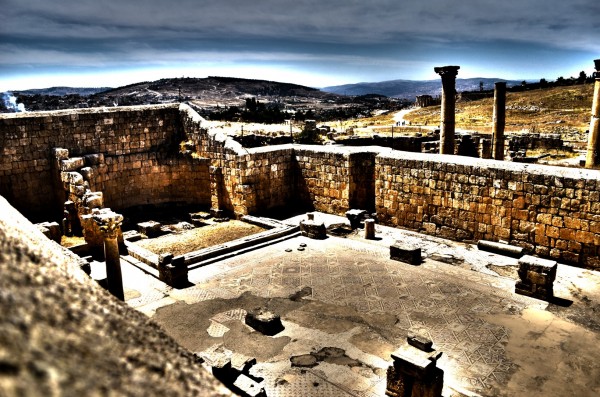
Jordan – the Christian population – Church in the Roman ruins at Jarash. Ancient Church Ruins at Jarash
I am literally in love with this attitude in Jordan… and am, therefore, not surprised that it has managed to stay away from any debilitating conflict that plagues the region. By the way, even though Arabic is the official language of Jordan, English is widely used and understood… so communicating isn’t a major hassle.

Jordan – the Christian population – At Mount Nebo. The important thing to remember is that Jordan respects the miniscule Christian population that stays here… and this place is the holy site for Christians
The scarf says it all
The first thing that confounded me in Jordan was the head scarf that the males wore. You know, that red and white squared one… or was it the one with black and white squares? I was walking down the Rainbow street in Amman when I suddenly stopped and asked a middle-aged man sitting on a chair in front of his art gallery, ‘Your head scarves confuse me.’

Jordan – the scarf says it all – Notice the Jordanian and the Palentenian colour scheme. The head scarf, also called a Keffiyeh or Kufiya are used by locals to identify each other
The man smiled, offered me a bottle of water (this is a premium gift anyone can give you in the region) and said, ‘Scarves protect us from heat and sand. And they also help us identify each other.’ He smiled a smile that had intrigue written all over and I knew I was in a region where identity mattered. This man told me that the scarf was called a keffiyeh or kufiya (by the way, khufia in urdu means secret) and some also called it a ghutrah, shemagh, a ?a??ah, a mashadah, a chafiye, or even a cemedanî and is the traditional Middle Eastern headdress and worn by Arabs, Kurds and some Jews, and Turks.
He showed me his keffiyeh and told me that a Jordanian scarf was with red and white squares and had decorative wool tassels on the sides. Bigger tassels were indicative of the wearer’s status. ‘But the Beduoins wear it as a symbol of honour,’ he added, ‘and we prefer to call it our shemagh mhadab.’ If you are careful you will notice that the Palestanians wear a black and white squared scarf and it is said that their keffiyeh emerged as Palestanian nationalism in the 1960s when Yasser Arafat adopted it as a symbol.
The agal is that black rope that holds the scarf in place and the keffiyeh is worn by men of all ages, whether on the head or around the shoulders. It was fun to notice that people in my gAdventures group had bought both the Jordanian as well as the Palestanian keffiyeh and I must admit that wearing it does protect one from the sun and the sand.
The Bedouins aren’t just any nomads
The Bedouins or the desert dwellers form a major part of Jordan’s population… and Ayman, our gAdventures CEO told us that even the King has Bedouin blood flowing through him.
During our stay in Wadi Rum, we did have a small conversation with a Bedouin in his tent and also loved the black goat hair tent from inside. Ayman informed us, ‘Crossing the desert with a Bedouin guide was once impossible and getting lost was obvious.’ The BEDU or the Bedouins are extremely patriotic, have a feeling of community and are said to be the backbone of the Kingdom.
Visiting Jordan would remain incomplete until you’ve heard Bedouin sing as he plays the rababa and gets up to serve you tea or coffee. The incense inside a tent is lovely as is the hospitality. I also noticed a part of the area outside the tent marked by stones with an arrow like indicator… ‘This is where the Bedouin come to pray and the indicator shows the direction of Mecca,’ said Ayman.
Yes, the Bedouins aren’t just any nomads because their tribe or qabila is spread throughout the south and east of the country. The Bedouin who we met told us that his family has its own tent and in their village they are a clan and a lots of clans form a qabila or tribe. My interaction with the Bedouins did not end with a visit to their tent… we stayed in a camp with Bedouin-like tents, had food that they prefer, and even did a night hike to give a feeling of getting lost in the vast desert and having to depend on the stars and other indicators for direction.
The stay in Wadi Rum was as adventurous as the rest of the trip… and I must admit here that the chants that the Bedouins sing depends mainly on various poems created by the most talented poets of the Arabic Language history and this is one reason why I’d love to go back to Jordan. Yes, I’d love to be back to live with the Bedouins and understand the way they think and the songs they sing.
There is always a lot more
Well, to understand Jordan you need to know that most of their population lives in Amman… and the rest of the country is mainly Muslim and fairly orthodox. I noticed that the women in Amman did not wear the Hijab and were quite open and even visited the pubs – to drink beer as well as to smoke shisha. It is, therefore, advisable for women travellers to be prudent in the dresses they wear once they leave Amman and travel to the smaller towns and cities.
The King in Jordan is highly respected and I was rather intrigued to know the way the elected members of the Jordanian parliament interacted with the royalty. The King, I was told, is the supreme power and though the MPs are elected through an election where the common man participates, the Prime Minister is selected by the King. The PM, in turn, selects his cabinet. The strange part is that the King also has the power to dismiss a PM any time and select a new one… and in the past three years this has happened many times! I think it is necessary to understand the way a country interacts politically with the people and so my readers will surely find this info interesting.
Another little factoid that I stumbled upon is that literally everyone in the country is working for the police… yes, it is said that Jordan has one of the best internal security agency in the Middle East. I guess being in the middle of a conflict zone isn’t easy and to top it all, the country has had to deal with a massive number of refugees as well. Once inside Jordan, these refugees have to work hard to get their citizenship card and because they realise the wonderful way the King and the parliament is managing the affairs of the country, I found even Palestinian refugees proudly declare that they are Palestinian Jordanian! Now this speaks really well of the way the country is administered.

Jordan – Some general observations_A local restaurant in Madaba. The Kingand his sons find a place on walls, in shops, and even on the artifacts that are sold.
The only fact that intrigued me and I was not able to find any plausible reason is the high bounce that the Jordanian currency has… we Indians have a tough time when we realise that I JoD or Jordanian Dinar is equal to almost 90 INR. ‘Why?’ I asked many, ‘what is it that you guys do here?’ They don’t have oil wells, they don’t have pirates bringing in moolah, they don’t have industry, their tourism isn’t as much as they expect, and they don’t export anything but phosphate… and yet their currency is always on a high. I’d love to know why.
Last word
All that I want to say is that Jordan is safer than most safe countries, has more than whatever it is that one may want from a visit to a foreign country, and the people are friendly.
What more would a tourist want?
Well, I guess anyone interested in really exploring a country needs to know more about gAdventures. I loved being a part of their group… and just might enrol for more adventures later.
.
.
.
More pictures…
.
.
.
Arvind Passey
08 October 2015
.
First published in CNK Travelscapes on the 21st of September 2015

